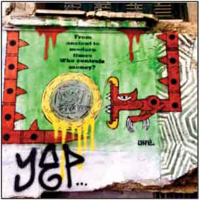
Social Dynamics
Birth Trauma Memories in the Greek Crisis
by Marc-André Cotton
This article was published in Psychohistory News, Volume 34, No 3, Summer 2015.
Abstract: As Greece’s debt crisis unfolds, empirical evidence of a collective restaging of birth trauma emerges behind the hard economic facts. Prenatal psychology and Vamik Volkan’s concept of “time collapse” shed a fresh light on the Greek struggle.

At the crack of dawn on July 13, 2015, after more than 17 hours of talk, European leaders announced a deal that would keep Greece in the Eurozone. Conceding a further swath of austerity measures and economic reforms, Greek Prime Minister Alexis Tsipras opened the door for a third three-year bailout intended to keep the country’s struggling economy alive. Three days later, a large majority of Greek members of Parliament backed the internationally mandated measures—many of which had been rejected by votes in a public referendum on July 5, 2015.
“A catatonic state”
To adopt such drastic measures, Tsipras found himself at odds with the left within his own party, but got the support of the former ruling party New Democracy, as well as the rightwing Independent Greeks. Indeed, the agreement reached will deprive the country of an enormous amount of its sovereignty. As one commentator stated bluntly: “Greece is no longer master of its own destiny[1].” But quite remarkably, although European officials stated they were ready to force a “Grexit”, the radical left-wing Greek government—elected in January on an anti-bailout program—has made no meaningful plan to leave the Eurozone such as discussing the technicalities of adopting a new currency.
Professor of Economics at the University of Athens, Yanis Varoufakis yet predicted “the derailment of the train that is the Eurozone” and coined European monetary policies “a comedy of errors” before his appointment in January 2015 as Finance Minister of the Tsipras’ cabinet. In the midst of the Greece turmoil, his shared feelings are of particular significance to make sense of the deep psychohistorical factors underlying the current crisis. Three years ago, in an ABC News 24 interview by Leigh Sales, Varoufakis stated:
“This is our Great Depression. Not only in an economic sense, but also in a psychological sense. Greeks are in a catatonic state. One moment in a state of rage, another, this is a typical case of manic depression. There are no prospects. There is no light at the end of the tunnel. There are sacrifices, but nobody gets a feeling that these are sacrifices that take the form of some kind of investment in turning the corner. This is the problem when you are stuck in a Eurozone which is really badly designed, which is collapsing and which does not give opportunities to its flimsier parts to escape through some kind of redemptive crisis[2].”
Such a public statement carries strong emotional overtones resulting from the close interweaving of past and present sensations—a regressive process Dr Vamik Volkan has termed “time collapse” in his many books and articles[3]. Fears and intra-psychic defenses associated with a past traumatic experience tend to resurface when triggered by a contemporary menace such as social unrest or economic downturn, often reactivating a sense of victimization. In such a case, current perceptions and traumatic memory become inextricably interwoven into a seamless totality.
Fantasies at play
On an individual level, re-experiencing such feelings as rage and depression while being stuck in a dead end may signal the resurfacing of deeply repressed prenatal and perinatal memories, as evidenced by numerous works in birth psychology. The anxiety endured by a pregnant mother at the prospect of giving life is conveyed to the unborn child notably during labor. This is particularly true where cultural and religious beliefs traditionally associate childbirth with intense suffering and possible death, as did the genre of classical Athenian tragedy or the Orthodox Church for that matter (read box below).
Pains of childbirth
Ancient Greece’s culture and the genre of tragedy in particular associate the female body with torment and pain, particularly that of labor[4]. In Euripides’ Medea for instance, the poet extols the sacrifice of a mother who would, in the same way men do, “rather stand three times in the front of battle than bear one child[5].” This painful condition which devolves on women is intrinsically linked to the experience of birth, a fate later voiced by the Orthodox clergy on the ground that only Mary Mother of God, the Blessed Virgin, gave birth without pain.
As a possible consequence of such problematics, the rate of Caesarean delivery has soared in contemporary Greece, as noted by Elsa Pimenidou, a member of the organization Birthchoice: “Officially, the Caesarean birth rate is 50 % but it is actually 70 %. Until a few years ago, Brazil ranked first, but Greece has already taken the lead[6].” Studies show that this mode of delivery is influenced by fear of vaginal birth[7].
According to an expatriate, it is very difficult to give birth naturally in Athens where obstetricians “all perform routine episiotomies and discourage rooming in and nursing[8].” A 2009 survey estimated that the breastfeeding rate six months after birth has been reduced to 4 % as a result of “the distinct lack of a breastfeeding culture in Greek society[9].” A recent report by International Baby Food Action Network (IBFAN) expressed concern over “the lack of education on breastfeeding and support for mothers who wish to breastfeed.” Because of the high rate of C-sections and the active promotion of breastmilk substitutes in hospitals, less than 10 % of mothers breastfeed exclusively for the first 6 months[10].
MCo
Widespread fantasies that “one has to sacrifice” or that “one’s badly designed setting is collapsing” could very much stem from such traumatic birth experience. Indeed, if the newborn doesn’t heal by fostering a deep maternal bond in the following months—notably through breastfeeding, which is rarely encouraged in Greece—he/she is likely to struggle in defining his/her own independent self. The relevance of these early imprints as public health and social issues can be contemplated as Greek youth unemployment reaches a historical high in the midst of economic depression (fig. 1).

Fig. 1: Graffiti displaying womb and traumatic birth symbols in the streets of Athens. (www.huffingtonpost.com, July 6, 2015)
To cope with their emotional upheaval and like their ancestors did, Greeks express deep resentment against overweening Western Powers. Professor of Hellenic studies currently teaching at Thessaloniki, Molly Green points out: “For the people who voted ‘no’ [to the July 5 bailout referendum], it was, once again ‘we’re being pushed around by other European countries as though we’re not a part of Europe’.[11]”
Historical struggle for differentiation
Defining one’s identity is an inner working model for large groups too, as Dr Volkan further suggests. In this perspective, it has been stressed that Greece never fully completed individuation as a modern state. Gaining independence from the Ottoman Empire in the late 1820s, the Greeks were forced to accept a Bavarian prince as new monarch, King Othon of Greece, then still a minor. The Great Powers of the time, Russia, United Kingdom and France, helped secure the Greek borders but made it clear the newcomer would never be in position to compete in the European arena.
In the 19th century, Grecophiles such as English poet Lord Byron—whose death in the Greek War of Independence was romanticized—helped plant Hellenism as the nation’s foundation myth centered on the glory of antiquity. Western Europeans manufactured a “fantasy Greece” largely based on idealization of ancient Athens as the “cradle of democracy.” Today, the average Greek citizen still beholds Europe with fear and suspicion as the country never quite made a transition to modernity. Interviewed by Newsweek, Greek actor Antonis Kafetzopoulos put it this way: “We always tried to compromise between the old Ottoman establishment and modern Europe[12].”
This troubled relationship between Greece and Europe, which goes back nearly two hundred years, was enabled by European lenders. After independence, Greek rebels didn’t repay European loans granted to fight the Ottomans, but creditors poured more money into the country in 1832 when King Othon was installed. Half a century later, Greece over-borrowed in foreign markets and defaulted again in 1893. Even back then, an “International Committee for Greek Debt Management” was formed to force reforms!
A political birth process
What is to be done? However irresponsible Greek governments may have been in the past, this has not been the case with the two most recent bailouts. As Nobel laureate economist Paul Krugman has pointed out, Athens faithfully enacted the austerity policies demanded by its creditors and, through no fault of its own, the policies did not work. Now, at the time of this writing, the gods in Brussels and Berlin are imposing a third round of austerity policies that are no more likely to succeed than the previous ones.
Believing they must remain in the Eurozone at all costs, the current Greek government and apparently the majority of its citizens are accepting this fate. But apparently, Greece will not do without a painful political birth process. The ability to distinguish the present reality from the emotional upheaval it triggers is only more necessary to work through this difficult stage.
Marc-André Cotton*
© M.A. Cotton – 10.2015 / regardconscient.net
*Marc-André Cotton, MA, the President of the International Psychohistorical Association, and an International Member of the Psychohistory Forum, is a teacher, independent scholar, and director of the French website Regard conscient, dedicated to exploring the unconscious motivations of human behavior. He authored the French psychohistorical book Au Nom du père, les années Bush et l’héritage de la violence éducative published in 2014 by L’Instant présent (Paris).
Notes :
[1] Mary Dejevsky, “Grexit may have been avoided, but divisions in Europe are growing”, The Guardian, July 13, 2015.
[2] Leigh Sales, “Greek election holds questions for economy and eurozone”, ABC News 24, June 18, 2012.
[3] See for instance Vamik Volkan, “Chosen Trauma, the Political Ideology of Entitlement and Violence”, June 10, 2004.
[4] Katrina Cawthorn, “The female body and suffering” in Becoming Female, the Male Body in Greek Tragedy, Duckworth, 2008, 50-53.
[5] Euripides, Medea, translated by Rex Warner, Dover Thrift Editions, 1993, 9.
[6] Anastasia Balezdrova, “Greece ranks first in the world in number of Caesarean births”, GR Reporter, December 8, 2011.
[7] Despina Sapountzi-Krepia et al., “Mother’s experiences of pregnancy, labour and childbirth: A qualitative study in Northern Greece”, International Journal of Nursing Practice, 2011, No 17, pp. 583-590.
[8] “Expat Advice: Having a Baby in Athens”, Expat Exchange.
[9] Iliadi Panagiota and Ermioni Palaska, “Breastfeeding and Contemporary Life: The Greek Reality”, Nosileftiki, October 2009, Vol. 48, No 4, 352-357.
[10] IBFAN, “Greece: Unfavorable Environment Leads to Extremely Low Breastfeeding Rates”, Breastfeeding & Human Rights, June 7, 2012.
[11] Molly Green, quoted by David Graham, “How Greece Became European”, The Atlantic, July 7, 2015.
[12] Antonis Kafetzopoulos, quoted by Adam LeBor, “The Greek Crisis Reveals a Nation Crushed by Ancient History”, Newsweek, July 7, 2015.
